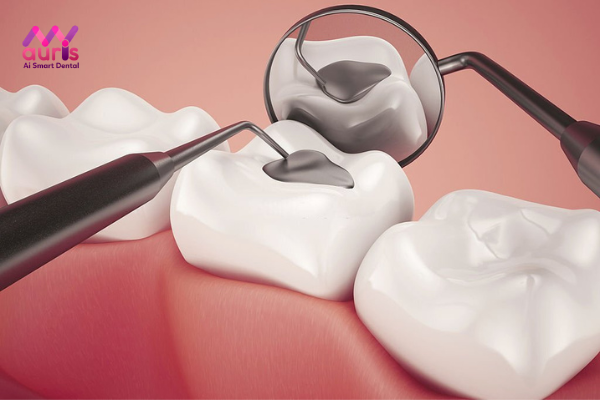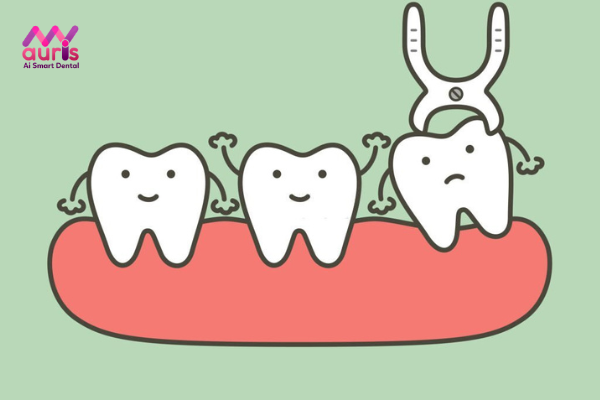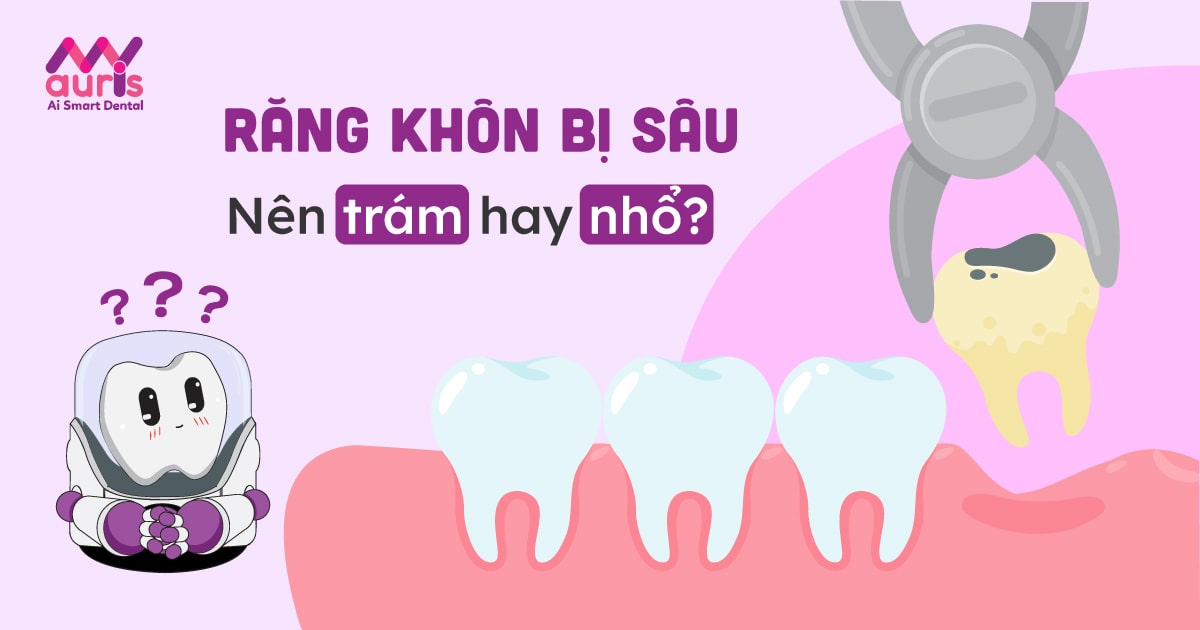A decayed wisdom tooth is a very common condition, often causing more pain than other places although it does not play an important role when chewing and ensuring aesthetics.
A impacted wisdom tooth caries: signs of recognition
Wisdom teeth are also known as teeth number 8 and usually grow when people reach adulthood from 18-25 years old.
Wisdom tooth decay is a very common condition because wisdom teeth are located deep in the jaw, so ensuring their cleanliness is very difficult. When wisdom teeth are decayed in the early stages, it will be difficult to recognize, but when there are one of the following signs, you should go to the dentist for timely treatment:
- Continuous or intermittent pain in wisdom teeth.
- Teeth are sensitive when eating cold, sweet, or sour foods.
- Brown and dark spots appear on the surface of wisdom teeth.
- Pain when swallowing saliva or opening your mouth.
- Pain or sensitivity in the gums.
- Gums are swollen, red and inflamed.
- Breath odor, often metallic.
- May cause headache, fever, nausea.

Causes of wisdom tooth decay
According to many experts on the Dental problems and tooth decay can originate from the following problems:
-
Tooth position
As mentioned above, wisdom teeth are located in a hidden position, so it is very difficult to clean them 100% completely, so the plaque will turn into tartar over time. Tooth enamel will be attacked by bacteria accumulated in tartar and form small cavities.
-
Tooth shape
Tooth number 8 is short in length, has a large chewing surface, and has groovesh and interstitial spaces where food easily stagnates. Combined with the position on the jaw, tooth decay is very likely to occur.
-
Wisdom teeth grow crookedly
Wisdom teeth grow when the jaw has developed stably, so they often grow misaligned and crowded with adjacent teeth. This misalignment problem will create gaps between teeth, causing food to get stuck in and creating conditions for bacteria to grow.
-
Some other causes
Wisdom tooth decay can also occur due to factors such as drinking less water to dry the mouth, diet, smoking, and having gastroesophageal reflux disease. management,…
What are the effects of decayed wisdom teeth?
So do decayed teeth need to be treated? Or what should I do if my tooth is decayed? Before finding answers to these questions, let’s learn about the consequences caused by decayed wisdom teeth.

-
Teeth with long-term decay can penetrate into the pulp – an area where many nerves and blood vessels are concentrated. At this time, you will feel extremely painful and increase the risk of losing teeth.
In addition, when a tooth decays, it can spread to adjacent teeth and cause widespread tooth decay.
-
Unfavorable effects on the digestive system
The condition of wisdom tooth decay makes chewing food painful and difficult, easily leading to not chewing thoroughly or anorexia. This will cause diseases such as stomach pain, colitis, etc.
-
Effects on organ systems and overall health
Bacteria from cavities can spread throughout the body, weakening the immune system , affecting organ systems and overall health.
-
From the above effects, now you surely know that dealing with tooth decay is extremely important.
What should I do if my wisdom teeth are decayed: should they be extracted or filled?
What should I do with the problem of decayed teeth, now? There are many treatment methods such as fluoride, tooth extraction, porcelain crown, root canal treatment, tooth filling, etc., of which the two most commonly used methods are tooth extraction and tooth filling. Depending on the condition and level of decay of the tooth, the question of whether the decayed tooth can be filled or whether the decayed tooth should be extracted will be specifically determined by the doctor.
Filling wisdom teeth
This is a method applied when wisdom teeth grow straight, do not compress other teeth at all and only have slight decay. Filling the cavity will prevent the cavity from eating into the pulp or spreading to adjacent teeth. To fill a cavity, below are the steps the doctor will take:
- Before proceeding, the doctor will order an X-ray to evaluate the general condition of the teeth and check whether the level of tooth decay is still suitable for filling or not.
- Next, you will have your teeth cleaned and your teeth scaled if necessary.
- The doctor performs local anesthesia to avoid causing sensitivity during the tooth filling process.
- Use specialized equipment to remove tooth decay.
- Restoring tooth shape with artificial materials such as gold, silver, composite resin,…
- Finally, laser is used to speed up the setting and adhesion of the filling materials to real teeth.
This entire process will take about 20 minutes or maybe longer depending on the state of tooth decay in the patient. staff.

Wise tooth filling with decay Wisdom tooth extraction
There are many cases where teeth with decay are prescribed by doctors to be extracted. The first is when the decayed tooth is growing crookedly, crowding and squeezing other teeth, and can grow horizontally into the roots of neighboring teeth. Another case is that the wisdom tooth has severe decay and has penetrated deep into the pulp, unable to respond to conservation measures, affecting the blood vessels and nerves inside. When the decayed tooth is too large or too small, the distance from tooth number 7 is too wide, causing food to easily stagnate, it will also be removed. In addition, if tooth decay recurs many times and causes swollen gums, pus and a lot of pain, wisdom tooth extraction will definitely be indicated.
You can rest assured that tooth extraction will not be painful because the doctor always anesthetizes during the extraction process. You will only feel pain after the tooth has been extracted and the anesthetic has worn off. Taking medication as prescribed by your doctor and actively resting is very important to reduce and quickly resolve this pain.

Wisdom tooth extraction How to relieve the pain of decayed wisdom teeth at home
For school In case you know you have a decayed wisdom tooth but for some reason you can’t go to the dentist right away for treatment, here are 3 ways you can apply to temporarily relieve the pain at home:
- Gargling with warm salt water: Gargling with warm salt water 2-3 times a day will help disinfect, reduce inflammation, and improve pain and swelling caused by tooth decay.
- Ice: Apply an ice pack to the cheek and jaw area for 10-15 minutes twice a day to help reduce pain and swelling.
- Diet: You should eat soft foods and avoid cold, sweet, sour, hard and chewy foods and drinks.
To be able to treat cavities safely and Ultimately, you should go to reputable dentists like My Auris. To know more about the treatment service for wisdom teeth diseases as well as experience the WTS international standard customer journey, please contact My Auris immediately!
-





